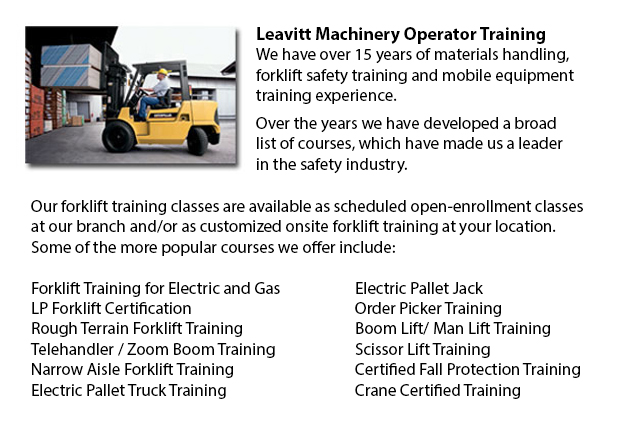
Forklift Training Classes BC - Lift truck are heavy pieces of industrial machines that are made use of in transporting and the handling of materials and merchandise. They are commonly referred to as Lift trucks and are found in all kinds of businesses. Workers working with and around forklifts need to be trained to spot dangers related with the utilization of lift trucks.
We provide training classes referred to as Safe Operation of a Forklift. The classes provide instruction in the theory part of becoming a forklift operator. Trainees would learn their legal tasks as forklift operators. Upon completion of the classes, a printed certificate would be issued. The certificate has to be signed by an individual authorized to verify that a hands-on evaluation has been finished within the trainee's workplace.
Forklift Safety
Lift trucks are made use of extensively in industrial work environment due to their ability to transport and lift heavy loads. These industrial machines are essential and indispensable for lots of organizations, nevertheless they could be dangerous if operated by workers which is not properly trained. Lift truck injuries, when they take place, tend to be serious due to the power of these heavy machines. Staff who work often around forklifts can become complacent and forget the dangers. Vital operating and maintenance procedures may be ignored.
Forklift training is needed for new staff, but all operators have to undergo periodic re-training. First aid training is essential also.
Daily inspection procedures are of critical importance. Lift trucks could become damaged if they are not inspected regularly. Before being used, lift trucks have to be visually inspected as to their general condition. An operational inspection should be done to determine the equipment is properly functioning. The supervisor has to be alerted if anything is noted which could impact the safe use of the forklift.
A check determines if the area is clear of things which could pose a danger. Any overhead obstructions must be noted. Check that a functioning fire extinguisher is accessible. Different levels must be inspected, like for example engine oil, fuel, radiator water, and electrolyte levels in cells. Battery, cables and plug must be checked. Clean out vent caps and ensure that bolts, nuts, guards, chains, and hydraulic hose reels are not damaged, missing or loose. A tire inspection will make certain that wheels are not worn or damaged. Pneumatic tires will require a pressure inspection.
-
Zoom Boom Ticket BC
Zoom Boom Ticket BC - Zoom Boom Training focuses on correctly training prospective operators on variable reach forklifts. The training objectives include gaining the understanding of the equipments physics and to be able to define the job of the oper... More -
Scissor Lift Training BC
Scissor Lift Training BC - When operating a scissor lift, they should be used competently in order to protect the wellbeing of the other personnel in the workplace and to protect the safety of the equipment. Operators who are skilled are trained to d... More -
Wheel and Track Loader Training in BC
Lift trucks are obtainable in several load capacities and several models. Nearly all forklifts in a regular warehouse surroundings have load capacities between one to five tons. Bigger scale models are used for heavier loads, like loading shipping co... More -
Zoom Boom Training BC
Zoom Boom Training BC - Zoom Boom Training focuses on properly training prospective operators on variable reach forklifts. The training goals consist of gaining the knowledge of the machine's physics and to define the responsibilities of the operator... More -
Heavy Equipment Operator Certification BC
Heavy Equipment Operator Certification BC - The heavy equipment operator is a person who manipulates the controls and drives various types of huge machinery. Heavy machinery is most commonly used on construction sites to deliver supplies to the site... More -
Crane Ticket BC
Crane Ticket BC - New cranes can either be complex or simple, based on the nature of the application they are able to do. For example, mobile cranes are rather simple models. A steel truss and even a telescopic boom mounts its movable platform. A sys... More -
Telehandler Training in BC
Telescopic handlers normally known as telehandlers for short, are a very popular piece of heavy construction machinery. They are commonly utilized in the construction and agricultural industries. These equipments have maximum reaching capacity and ar... More -
Wheel Loader Training BC
Wheel Loader Training BC - Normally, the various types of heavy equipment training are divided into 2 categories of equipment: those which have rubber tires and tracked vehicles. Tracked vehicles comprise items like excavators, cranes, and bulldozers... More

Forklift Training BC
TOLL FREE: 1-888-254-6157
forkliftcertificationbritishcolumbia.com
Email Us
About Us


